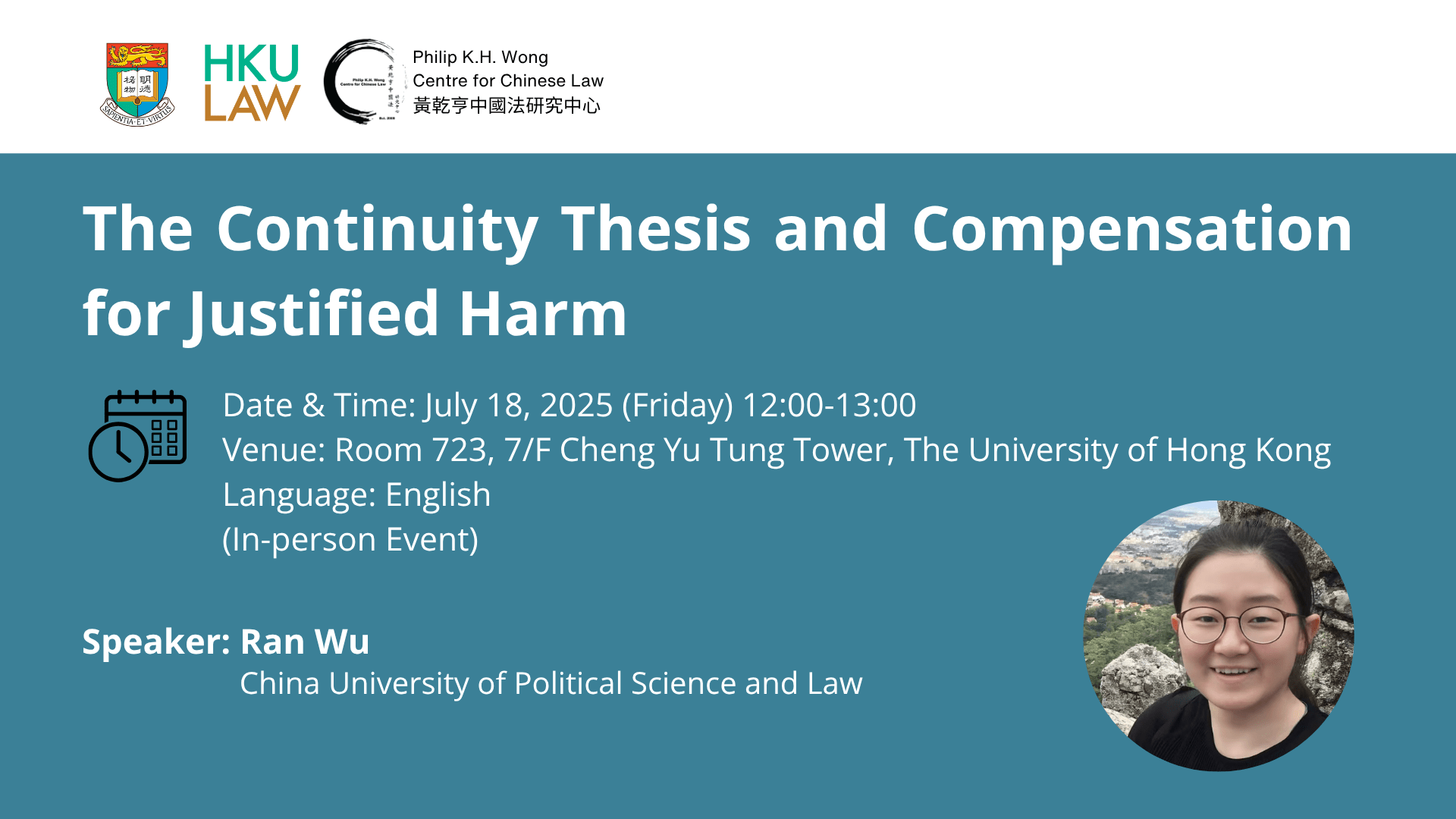
The Continuity Thesis and Compensation for Justified Harm
Date & Time: July 18, 2025 (Friday) 12:00-13:00
Venue: Room 723, 7/F Cheng Yu Tung Tower, The University of Hong Kong
Language: English
(In-person event)
Abstract:
The Civil Code of the People’s Republic of China recognizes in some circumstances legal compensation for justified harm, where a harm-doer does not commit an all-things-considered wrongdoing to a victim. Similarly, in the common law of tort, courts sometimes also support a legal duty of compensation for justified harm. Advocates of the continuity thesis have made an effort to address a moral or legal duty of compensation for justified harm. However, I will show that advocates of the continuity thesis fail to give a consistent account of our different attitudes towards a moral duty of compensation in different kinds of cases involving justified harm.
The pro tanto duty approach insists that a harm-doer breaches a pro tanto primary duty in causing justified harm. It fails because it cannot explain why a harm-doer who breaches a pro tanto primary duty does not always have a duty to compensate for justified harm. The modest version of the reasons-continuity thesis appeals to reasons justifying a harm-doer’s pro tanto primary duty. It fails to account for a third-party beneficiary’s duty to compensate for justified harm. Ripstein’s incomplete privilege strategy seems to rely either on a pro tanto wrongdoing or a special and unclear sense of all-things-considered wrongdoing. Weinrib’s restitution strategy maintains that a primary duty continues in the absence of wrongdoing. Nevertheless, these two strategies fail to explain why a harm-doer who prevents herself from being harmed by a victim or who saves a third-party beneficiary in an emergency does not have a duty to compensate.
I will also point out that various versions of the continuity thesis overlook two important aspects of cases involving justified harm. One aspect is ‘benefit’. The other aspect is a harm-doer or a beneficiary’s agential authorship of the harm that a victim suffers. Overlooking these two aspects makes the continuity thesis unable to explain why a moral duty of compensation for justified harm is justified in some situations while it is not justified in some other cases. I conclude that a new approach is required and the two aspects above highlight the strong potential of outcome responsibility as a new account of compensation for justified harm.
Speaker:
Dr Ran Wu, is teaching jurisprudence at the School of Law, China University of Political Science and Law. Before joining CUPL, she obtained a doctorate from King’s College London (2024) and a doctorate from China University of Political Science and Law (2019). Her main research interests are general jurisprudence, the philosophy of tort law, moral philosophy, rights theory and responsibility theory.
Chair:
Professor Hui Jing is Assistant Professor of Law and Deputy Director of the Philip K. H. Wong Centre for Chinese Law at The University of Hong Kong.
This is an in-person only event for the audience. Prior registration is required. Please visit https://bit.ly/3HdFXwj to register. For inquiries, please email Louisa at .
To watch recordings of past CCL events, please subscribe to our YouTube channel: The Centre for Chinese Law – YouTube. To keep up with our activities, follow us on Twitter https://twitter.com/CCLHKU. Philip K.H. Wong Centre for Chinese Law at The University of Hong Kong promotes legal scholarship with the aim to develop a deeper understanding of China and facilitate dialogue between East and West. For more information, visit: Philip K.H. Wong Centre for Chinese Law

